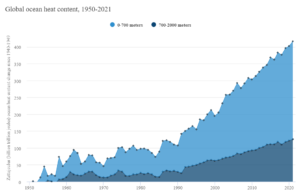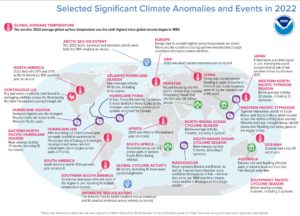
In 2022, Earth reached another top 10 hottest year on record.
This was expected.
The global surface temperature is getting hotter, on average, but there is variability year to year due to El Niño and La Nina events or the occasional volcanic eruption — and air pollution could be masking some warming. The last nine years are among the 10 warmest on record.
Last year, the planet was at least 1.1 degrees Celsius hotter than the Industrial Revolution.
“While that may seem like a small number, just small changes in temperature can have big impacts around the world,” Kate Calvin, the chief scientist at NASA, said last week during a press conference.
(1 of 6) It’s official: Earth had its 6th-warmest year on record in 2022, according to NOAA scientists.
The avg global surface #temperature was 1.55°F (0.86 of a degree C) above the 20th-century avg. https://t.co/O79dbB56hl@NOAANCEI #StateOfClimate pic.twitter.com/IxOvj05KTz
— NOAA (@NOAA) January 12, 2023
In cities and regions, this warming can translate to a lot of different outcomes. Many countries like Britain, Spain and France in Europe recorded their hottest years on record, while North America tied its 15th warmest year.
Davidson County recorded its 19th warmest year, with an average temperature of 59.9 degrees, and Tennessee had its 36th warmest year, with an average statewide temperature of 58.6 degrees, since 1895, according to the Tennessee Climate Office.
 Courtesy NOAA
Courtesy NOAA Tennessee has high variability year to year with average temperatures. Climate is usually measured in 30-year intervals.
The Nashville airport station recorded 61.8 degrees for its mean temperature. The average high temperature was the 8th-warmest on record, and the mean temperature tied for the city’s 11th-warmest on record, according to the Tennessee Climate Office.
Extreme heat was felt most acutely this past July, which was the second-hottest on record for Nashville. There were also long streaks of 90-plus-degree days that rounded out the city’s sixth-hottest summer ever.
Nashville and the rest of the state also experienced drought twice in 2022, first in the summer and again in the fall. The drought broke water pipes in Nashville and drained the Missippippi River to record lows near Memphis — which demonstrates how small deviations can disrupt the infrastructure humans built for the historical temperature range.
Across the U.S., climate and extreme weather disasters totaled $165 billion in damages in 2022.
“We know the changes that we’ve experienced so far are driven by greenhouse gases from human activity,” Calvin said. “What science tells us is that future warming will depend on future emissions. And if temperatures continue to rise we’ll continue to see more of these impacts and extreme events that we’re experiencing today.”
Global greenhouse gas emissions are continuing to rise, with new records set in 2022. The surface temperature of Earth might not reach record highs every year, even if the trend continues upwards.
From some perspectives, a better barometer for global warming is the oceans, which suck up an estimated 93% of heat from human-emitted greenhouse gas emissions, because there is less variability year to year than surface temperatures.
 Courtesy Carbon Brief
Courtesy Carbon Brief Oceans have been capturing most of the heat, about 93%, from human-emitted greenhouse gas emissions.
The main contributor to climate change is the burning of fossil fuels.
To limit or stop further warming, communities will have to end fossil fuel use.
“The truly dangerous radicals are the countries that are increasing the production of fossil fuels. Investing in new fossil fuel infrastructure is moral and economic madness,” U.N. Secretary-General António Guterres said last year.
In Tennessee, the main electricity provider, the Tennessee Valley Authority, has been pursuing new fossil fuel infrastructure for natural gas, which leaks methane into the atmosphere across the supply chain and emits carbon dioxide when burned.


